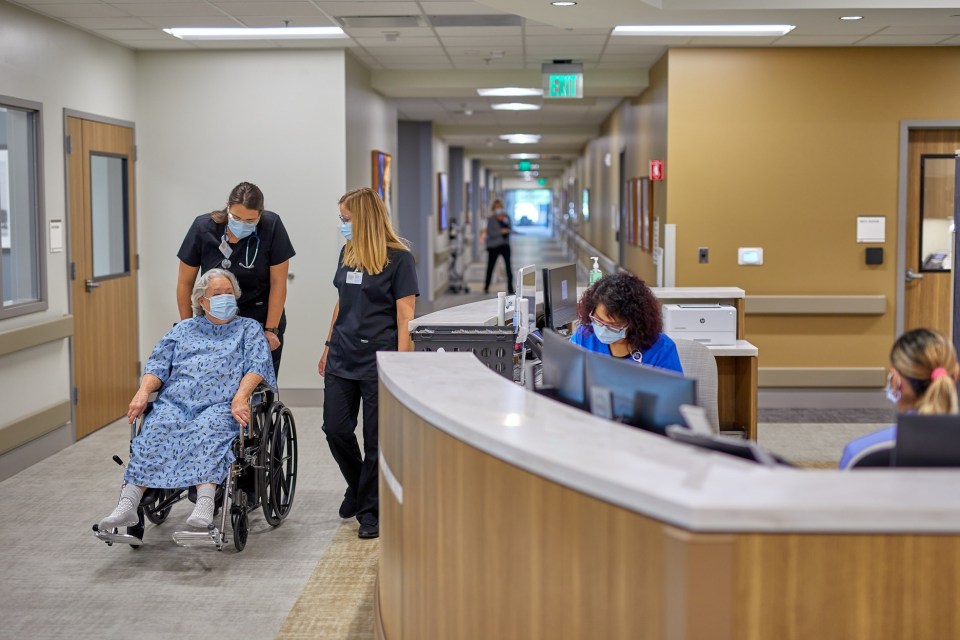Nurses who have chosen a career in inpatient rehabilitation know firsthand the rewards that rehabilitation brings—a deeper, more personal relationship with patients, a greater impact on their outcomes and the sense of pride and joy when a patient reaches a goal they once thought was unattainable.
Just as inspiring as the patients’ achievements, is watching the nurses who care for them achieve their own goals. In my 27 years with Encompass Health, I’m proud to say I’ve witnessed many skilled and compassionate nurses grow professionally. We have nurses who have started with us as a rehabilitation nursing technician and developed all the way into being a chief nursing officer.
Here’s just a sampling of the many job opportunities for inpatient rehabilitation nurses and the ways we support them throughout their careers.
Certified Rehabilitation Registered Nurses
Registered Nurses who become CRRNs are in good company at Encompass Health. We have more than 1,900 CRRNs, which account for about 10 percent of all CRRNs in the country.
CRRNs bring an expertise to the inpatient rehabilitation setting that not only improves patient outcomes, but also supports the entire clinical team. CRRNs are highly trained in disease processes related to rehabilitation and have a deep understanding of patients’ challenges — for example, the impact a stroke can have on a person’s brain and body including bladder and bowel issues. They are often called upon to precept other nurses and lead problem-solving and performance enhancement efforts within the hospital. Having more than 1,900 nurses specialized in rehabilitation on staff really sets Encompass Health apart.
RNs have access to resources to help them earn this valuable certification, including exam fee reimbursement, a pay raise, a one-time bonus and a test preparation guide.
Potential for Early-Career Nurses
I always have a proud moment when a nurse shares with me that they were able to go to school because of funds we provided as a company. That kind of support not only encourages RNs to seek additional certifications and advancement opportunities, but also empowers early-career nurses like rehabilitation nursing technicians (RNTs) and licensed practical nurses (LPNs) to take the next steps in their careers. There have been many instances over the years when a nursing tech or LPN has advanced to a RN and then into a nursing leader.
Impacting Others
It is pleasure to watch nurses work toward and become confident, strong leaders within their hospitals. Nurses with leadership aspirations take advantage of our partnership with Chamberlain University to advance their degrees at significantly reduced rates and learn from respected educators at Encompass Health’s Nurse Leadership Academy.
Leadership opportunities include:
- Nurse Supervisor: Act as the manager on duty ensuring all patients’ needs are properly assessed and met while providing exemplary patient care.
- Nurse Manager: Leaders who typically work directly under Chief Nursing Officers to oversee all nursing operations including employee activities and quality of patient care.
- Chief Nursing Officer: Seasoned nursing leaders responsible for developing a patient-focused, team-oriented culture at their hospital. CNOs also support cultural diversity within their hospital and represent nursing on the governing body and other hospital committees and ensure that our hospitals are properly staffed.
Other Roles for Inpatient Rehabilitation Nurses
Our nurses can also do a lot of other things and we are happy to walk alongside them as they expand their skill sets. For example, nurses can cross-train in other areas of the hospital to become case managers and quality directors. They can further their education to become infection preventionists, wound care coordinators, educators, admissions liaisons and even CEOs.
Explore Nursing Opportunities
At Encompass Health, we believe in helping nurses reach their full potential.
View Open PositionsThe content of this site is for informational purposes only and should not be taken as professional medical advice. Always seek the advice of your physician or other qualified healthcare provider with any questions you may have regarding any medical conditions or treatments.




